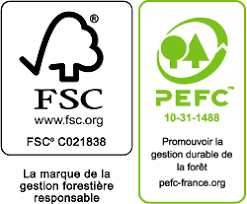Ethics and environment
We love our job and that implies respecting and valuing the materials used ...
With real experience in the various skills required in woodworking (which is, let us remember, a noble and living material), we are committed to scrupulously respecting the standards in force in terms of production / treatment and recycling.
Environmental benefits of wood
SEE full article
If the energy demands for manufacturing with wood are relatively lower than those with other materials, it is on the one hand because it is a virtuous material. Indeed, wood, unlike fossil fuels, is a renewable raw material. You may not know it, but wood is able to regenerate itself in less than a hundred years. In addition, it is an abundant resource, available locally and certified thanks to labels such as PEFC and FSC.
It should then be emphasized that wood is a low impact material due to its low weight thanks to which the energy used for its transformation can be optimized. It is also a dry material which helps reduce water wastage on construction sites. Its low thermal conductivity also makes it possible to make interesting energy savings.
Finally, let's add that wood is a recyclable material. Thus, its recovery or recycling can be done without damage to the environment. And this unlike other ordinary building materials. For example, sawmill waste that has been environmentally treated can be reused in the paper and panel industries. In addition to these advantages, wood is the only material whose use is beneficial in the fight against greenhouse gases (GHG), since it is an excellent "carbonivore". For example, in construction, wood is able to conserve all its CO2 stocks up to 1 ton / m3.
Deforestation: an overestimated effect
We have just seen the main environmental benefits of using wood. In this regard, it should be noted that nearly 2.8 billion earthlings use this material mainly in the form of wood or charcoal. As a result, it is often considered to be, in part, the cause of deforestation and GHG emissions. This is not the case, since studies have shown that this use does not exceed the capacities of the forest.
At Yale University in Connecticut, researchers have shown that only 27-34% of wood collection could cause the forest's capacity to be exceeded. However, according to the same study, in certain regions such as China or India, forests are still being replanted. This contradicts the claim that wood fuel (around 55% of the wood felled in the world) is a major factor in deforestation and climate change. Finally, with regard to global GHG emissions, the calculations of these researchers show that wood is the source of only 1.9% to 2.3% of said emissions.
Some clarifications from a construction professional:
Interview with Dominique Gauzin-Müller, Specialist in ecological architecture.
We are talking more and more about ecological architecture. What role does wood play in it?
Wood is the only renewable building material. Its use in structure, layout and cladding is therefore a means of preserving the reserves of other raw materials used in the building. The transformation of wood mobilizes little material and energy and the pollution of water, air and soil is very low.
The lightness of the wood facilitates installation without large machinery, limiting noise and dust during the site. A design that takes into account the manufacturing dimensions makes it possible to reduce waste, and therefore the volume of waste. These can be recycled, burned to produce energy or biologically degraded.
So the advantages of wood are only environmental?
More articles:
An exceptional insulator
Wood is a warm material ... in every sense of the word!
It is indeed an excellent insulator (it has a very low thermal conductivity): wood insulates 6 times more than brick, 12 times more than concrete, 350 times more than steel and 1,500 times more than aluminum!
Beyond the intrinsic qualities of the material, wood construction systems are very efficient in terms of insulation. The wooden framework, in particular, allows the insertion of a thermal insulation (glass wool, for example) in the heart of the walls. Result: minimum thickness, maximum insulation.
What are the advantages of wood in construction?
Only five years ago, only real wood lovers opted for this material, or those who wanted a different, original fireplace. Today, wood is no longer the preserve of an elite. The clientele is growing, because this material is becoming a real solution for everyone! The first argument is ecological: wooden construction sites consume very little fossil fuels.
In addition, they do not require water. Clean, they do not generate waste.
On the aesthetic side, this material allows almost any fantasy. Another advantage is that it can be industrially machined in the workshop and the structural elements assembled directly on the site. From where works faster, and less expensive, than for a construction known as "traditional".
Can we choose wood to build a bioclimatic house?
Wood is even ideal for this type of construction! In the first place, it naturally has insulating properties: perfect for what is called the building envelope. In addition, wooden constructions are free from thermal bridges. That is to say, they have no insulation fault.
Interview with Jean-Marie Barbier, Director General of the Federation of Private Foresters of France
Is the modification of the species map already visible in our French forests?
No, the modifications are rather visible on the forests which suffer, that is to say in the threatened regions and undergoing dieback. The 2003 drought, for example, weakened certain species such as beech, pedunculate oak and spruce.
Is global warming alone responsible for the foreseeable changes in the French forest map?
You can't say that. The effects of drought and water deficit are aggravating phenomena. But the tree reacts in the long term. The diebacks linked to the 2003 drought only added to the losses from previous episodes. The heritage is still suffering from the effects of the storm of 1999. In addition to the exceptional losses, many trees were damaged, their root systems torn off, considerably reducing their vitality.
On the pollution side, we were talking about acid rain for a while, I think that has nothing to do with it, except for exceptional areas, but that, on the other hand, the episodes of 1976, 1999 and 2003 had real impacts. .
Drought and water deficit are aggravating phenomena. But the tree reacts in the long term.
What are the impacts of global warming on forest management?
You can always make projections, but it's still fiction. However, the question really arises of today's plantations, which will be ripe in 100 years, a time which will be hit hard by global warming.
For the moment, we are looking for the best solutions in the short, medium and long term. This is why we are debating subjects such as regular high forest, whose principle of natural regeneration is no longer in phase with the current situation, and which within 50 to 100 years will change considerably. We must ask ourselves the question of the dynamics of forestry.
Should you grow fir or douglas? Long or short term? The Douglas at 40 will allow us to "pass through the drops", for both economic and climatic reasons. Unfortunately, the same cannot be said with crops 80-100 years old which risk experiencing periods of mortality.
It is for all these reasons that I advocate fast growing plantations so that they can be carried out and the crops are marketable.
Jean-Marie Barbier, Director General of the Federation of Private Foresters of France
Initially graduated from the National Agronomic Institute and specialized in forest ecology, Jean-Marie Barbier completed his course with a civil engineer diploma in Rural Water and Forestry Engineering. He then devoted his entire career to private forestry organizations. Deputy Director of CRPF Rhône Alpes (1975-1983), then Director of CRPF Limousin (1983-1995), Jean-Marie Barbier joined the Fédération des Forestiers Privés de France in 1995 as Deputy Director General and, since January 1, 2000, held the post of general manager.
La certification FSC
The Forest Stewardship Council
(FSC, Forest Support Council) is an environmental label, the aim of which is to ensure that the production of wood or a wood-based product respects procedures guaranteeing sustainable forest management. Insofar as the governance of this label is based on three colleges which in equal parts (in number of votes) deal with the three questions of quality and environmental, social and economic performance, the FSC is considered as an eco-label, but also as an eco-sociolabel. .
The 1994 FSC principles and criteria were revised in 2014, then validated in 2015 (as well as a list of generic indicators), thus updating national standards1.
In May 2017, a “Sustainable forest management reference system adapted for metropolitan France” was published. This is the new certification framework for forest management units, with the possibility of group certification.
Globally, the FSC wants to “Promote responsible management of the world's forests”; that is, management that is ecologically appropriate, socially beneficial and economically viable, making it possible to meet the needs of present and future generations. It aims for ecologically appropriate forest management, ensuring that the harvesting of wood and non-wood products maintains forest biodiversity, productivity and ecosystem functionality.
Socially beneficial forest management helps local people and society as a whole to enjoy long-term benefits and also motivates local people to conserve forest resources and adhere to long-term management plans.
Economically viable forest management means that forest operations are structured and managed in such a way as to be sufficiently profitable, without however generating financial profit to the detriment of the forest resource, the ecosystem, or the affected communities.
The FSC has endeavored to offer buyers and the public the maximum degree of credibility and encourages companies and communities to “design and implement a responsible wood purchasing policy”, in particular for tropical wood 3. WWF has provided for the implementation (during the first quarter of 2015) of a tool called “wood barometer” 4, for public authorities, on the model of PAP505).
In France it has set itself the objectives of:
develop the FSC certification of French forests (including Guyana);
develop the French market for FSC certified forest products;
fight against fraudulent or abusive use of the FSC label;
make this label known to professionals, consumers and public prescribers.
Certification PEFC
The Forest Certification Recognition Program is a private forest certification that promotes sustainable forest management.
Source : Bois.com
PEFC is the first forest certification system in terms of certified forest areas and the first source of certified wood in the world.
When a product bears the PEFC logo, this first of all guarantees the consumer that the wood it is made of comes from a forest managed according to the best rules adapted to local situations. These rules make it possible to really reconcile the three pillars of sustainable development: environment, economy, society.
Good forest management did not start with PEFC. The system is part of the continuity of the long history of European forestry, the first texts of which date back to 1346 in France.
By definition, foresters aim to conserve the forest. With its logic of continuous improvement, the PEFC approach leads them to be even more attentive to the preservation of biodiversity in particular.
Certification, or nothing?
Even if it is developing rapidly, certification still affects only a small part of the world's forest areas (less than 15%, FSC and PEFC combined). But an uncertified wood product does not necessarily come from a poorly managed forest!
In France, 95% of the wood is of European origin and you are therefore almost sure to buy wood from sustainably managed forests. Certification simply gives you an additional guarantee.
Chains of custody ensure that sawmills and other processors do not market more PEFC-marked wood than certified forests have produced. These chains of control are checked every five years by an independent approved body.
Ultimately, the PEFC system is based on a voluntary commitment. But its consistency and credibility are ensured by collective control. "We are the first interested in ensuring that the rules are respected," confirms Gilles Guespéreau.
Consultation is another feature of PEFC. At all levels (international, national and regional) the PEFC rules were discussed and developed by three colleges (producers, processors, users). This makes it possible to arrive at the best compromise guaranteeing that the rules are realistic, applicable and therefore effective.
Chain of custody
Certified wood:
FSC International is developing two types of certifications:
- certification of forest management
- and certification of the chain of custody (or chain of custody).
The latter is intended to control timber from certified forests throughout the supply chain, from upstream (the certified forest management unit) to the end customer, passing through all stages of the process. production and processing and possibly recycling of wood-paper waste. Thus, a finished product can only have the FSC logo once it has been checked by an independent certification body and accredited by the FSC at all stages of the chain.
The ten principles of FSC
More information
All ten principles and criteria must be applied in the forest before being able to receive FSC certification. They apply to all types of forests and to all activities included in the scope of the certificate.
The principles and criteria are defined at the international level, and broken down at the national level into indicators applicable in the field.
Principle 1
:
Respect for laws. Forest management must comply with all applicable laws and all international treaties to which this country is a signatory. It will also comply with other FSC principles.
Principle 2
:
Workers' rights and working conditions. The certificate holder must maintain or increase the social and economic well-being of workers.
Principle 3
:
Right of indigenous populations. This principle does not apply in mainland France.
Principle 4
:
Relations with communities. Forest management operations must maintain or improve the long-term social and economic well-being of local communities.
Principle 5
:
Benefits generated by the forest. Forest management operations should encourage the efficient use of multiple forest products and services to ensure economic viability as well as a wide variety of environmental and social benefits.
Principle 6
:
Environmental values and impacts. Forest management must maintain ecosystem services, biological diversity and associated values (water resources, soils, landscape, species and heritage habitats, etc.)
Principle 7
:
Management planning. A management document must be drawn up, applied and updated. The long-term objectives of management and the means to achieve them must be clearly stated. The development and revisions of this management document are carried out in consultation with the stakeholders.
Principle 8
:
Monitoring and evaluation. Monitoring is carried out to assess management practices: quality and quantity of forest products, maintenance of conservation values (environmental or socio-cultural).
Principle 9
:
High conservation values. The certified organization must identify, assess, preserve and monitor the high conservation values present in its management unit. These HCVs can relate to heritage species or habitats, critical ecosystem services, cultural sites, etc.
For more information on HCVs see the following website:
https://www.hcvnetwork.org/
Principle 10
:
Implementation of management activities. The management activities carried out by or for the organization in the management unit comply with all the principles and criteria of the FSC, and aim to achieve the economic, environmental and social objectives described in the management document.











